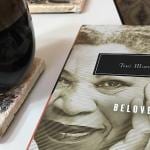
Want to be radical?
Examine the worldview of Mary Weston Fordham as if it might be true. Fordham has the temerity to be the woman she wanted to be: African, American, Christian, Victorian. A great many Americans objected and still object to one or more of those characteristics.
Mary Weston Fordham was brilliant at being herself against great odds. Booker T. Washington, also out of fashion, commended her work and she kept on writing poetry of the sort Victorian people, of every race, enjoyed.
How dare she?
She dared and she was very good at it.
She dared claim traditional poetic forms as her own, this being a country she and her family had helped build, and wrote the poetry she wanted to write as she wanted to write it. Mary Weston Fordham did not write what we would write, she wrote what she wanted or at least what she had been taught and accepted.
A response to this praise of a fine poet will be that she wrote what could be written, in the way it could be written, and Fordham was conventional, or Christian, or classical in her writing.
Why not?
In fact, if we are to understand the past, sometimes we have to accept that people did what they did. The reasons are complicated, some artistic choices were impossible or difficult then, but the work we have is the work we have.
If much of what we have is success, happiness, then we should begin there. If we explain too much away looking for hidden motives, then we might end up with everyone in the past looking just as we assumed they would. We can learn nothing new having appropriated the past to our present assumptions.
When I read her collection Magnolia Leaves, and please do, she takes poetry (sentimental, Christian, Victorian) and adds her voice, experience, and choice. When she chooses to write Atlanta Exposition Ode, admiring Booker T. Washington, that is not a choice many other able Victorians would make. She did ending “Let kindness as the dew distil/To friend and foe, alike, good will;/Till sounds the wondrous battle-call,/For all one flag, one flag for all.
She is putting out a hope for national unity based on shared values. This hope, like the vision of Booker T. Washington, was betrayed when white supremacy turned out to be the deepest value for too many. The nation failed.
This did not have to happen. Better men and women could have prevailed. Reparations could have been paid when they would have been easiest to pay. As it was, Fordham taught a rising generation, left beauty behind her, and created in her circle strong families. Fordham did not fail her values and so she did not fail. Beauty created endures whenever we catch a vision.
She wrote a poem on the death of a friend:
On Parting With a Friend
Can I forget thee? No, while mem’ry lasts,
Thine image like a talisman entwined,
Around my heart by sacred friendship’s ties
Remains unchanged, in love, pure love, enshrined.Can I forget thee? Childhood’s happy hours
Would like some flitting phantom mock and jeer;
Life’s sunny hours, would quickly lose their charm,
If Lethe’s slumbrous waves but touched me there.Can I forget thee? ‘Tis a sad, sad thought,
That friend from friend should thus be ruthless
riven-
But list, methinks, a sweet voice whispers low,
Remember, no adieus are spoke in heaven.Can I forget thee? No, though ocean’s waves
May madly leap and foam ‘twixt you and me,
Still o’er my stricken heart this yearning will remain,
Nor time estrange my love, dear one, from thee.And though on earth again we never more may meet,
In that bright Elysian where spirits, holy, dwell,
May we in concert with that transported throng,
Unite, ne’er more (rapt thought) to say ‘farewell!’
We have an old fashioned garden of memories here at The College and a tree planted to recall an absent friend. This poem fits my mood when I sit in the garden and recollect what cannot now be: we will meet but we miss him.
And I sometimes I mourn an America that might have been, that had so many powerful advocates. America of the 13th, 14th, and 15th amendments could have stayed that America. If a particular vision of America that might have been died, farewell. Heaven awaits and there, as Fordham knew and believed, Americans will stand before the Throne united one nation “ne’er more (rapt thought) to say ‘farewell!’”.












